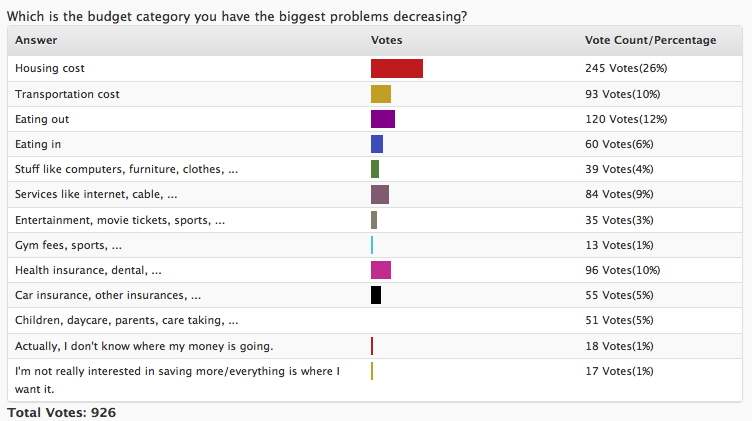Here are the results, in a graph, showing which budget categories, responders have the biggest problems reducing. A few days after posting the survey, I realized that the question was a bit ambiguously phrased. For example, housing costs may be hard to reduce further because they have already been significantly reduced (why athletes will lose any fitness contest based on relative weight loss) or they may be hard to reduce because of some inherent quality, e.g. the unavailability of inexpensive housing.
The results are given below. I was not surprised that housing cost came in as #1. In the past, especially in the past decade, housing has been promoted as a sure-fire speculation. Real estate prices never go down. Buy as much house as you can afford. Over the past 4 decades, housing sizes have gone up radically. It is not surprising that people then a) find themselves with too much space and b) unable to find smaller places. It is not impossible though as this exercise shows. I urge you to go through it even if you have no intention of moving; just to prove a point.
One thing that did surprise me is that people have their stuff under control. We have no conspicuous consumption of gadgets and consumer junk. Does that mean that people are not living in large spaces because they need space to store everything? I used to think this was a primary problem: “I can’t move into something smaller, because my footprint is too large” or “I need to move into something bigger, because I’m running out of space”.
The biggest surprise to me was the eating out category. Wow! This is a bigger problem than car payments and health insurance which I had guessed would be on third and second respectively. I hate eating out, so I have no problem controlling it. It is interesting how eating out generally means eating less healthy (a cheap way of making things taste good is loading them up with salt and fat/oil) which in turn drives up health insurance costs in the long run. It is interesting to note that some of the biggest companies in the US are drug companies and junk food companies. It is a good investment strategy: making people sick and then alleviating their symptoms. But please try not to be a victim of it. Then, of course, there is the social aspect of eating out. This is a cultural phenomena. I should probably reserve a blog post for alternatives to eating when hanging out with other people.
The biggest surprise was transportation coming in at #4. Either everybody walks and rides a bike or the expensive car, accounting for around 20% of the average budget or $1,000,000 extra in retirement for someone who works their entire life, is considered nonnegotiable. Or you all drive 15+ year old cars.
Originally posted 2010-06-09 10:10:25.


